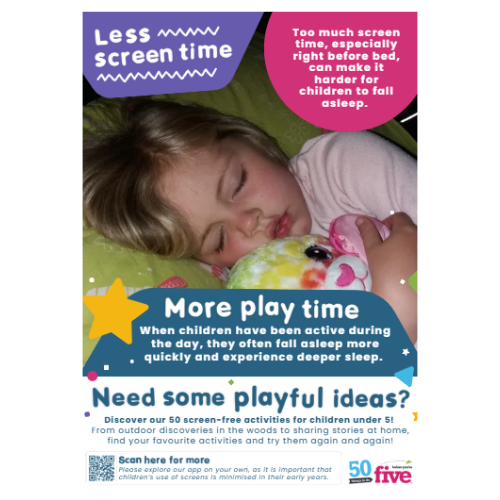Helping Families to Reduce Screen Time for a Better Sleep Time
03/09/25

As children settle back into their nursery routines after the summer holidays, it's common for families to find the transition a little challenging, particularly when it comes to bedtime. As early years practitioners, we are in a great position to support parents with simple, practical advice that can help their children get the rest they need to feel calm, secure, and ready for the day.
One of the most effective ways we can help is by encouraging families to establish a consistent bedtime routine. Children thrive on predictability, and having the same steps each evening, such as bath time, putting on pyjamas, brushing teeth, and enjoying a story, can really support emotional regulation and improve sleep. Gentle routines help signal to a child that bedtime is coming, making it easier for them to wind down and feel safe.
Another key message to share with parents is the importance of reducing screen time in the hour before bed. Screens, such as phones, tablets, and televisions, emit blue light which can interfere with a child’s natural sleep cycle. Suggesting screen-free activities such as reading, singing, puzzles, or simply having a chat about the day can be a helpful and positive alternative. It’s important to reassure parents that these changes don’t need to happen all at once, starting small, like turning off screens 30 minutes before bedtime, can already make a noticeable difference.
We can also encourage families to consider how physically active their child is during the day. Regular outdoor play, running, walking, or playing games that involve movement can help children burn off energy and support deeper, more restful sleep. A busy body often leads to a tired mind, making bedtime easier for everyone.
Creating a calm and sleep-friendly environment is another area where we can offer guidance. A quiet, dark bedroom that’s not too warm or cold can really support better sleep. Familiar comfort items, soft lighting, and a predictable bedtime routine all contribute to helping a child feel settled and safe at night.
When speaking to parents, it’s helpful to approach the topic gently and supportively. Informal conversations during drop-offs or pick-ups can be great opportunities to ask how evenings are going. Celebrating small successes and offering realistic, non-judgemental advice can go a long way in building trust and encouraging positive change. Where families are experiencing ongoing challenges, it may also be appropriate to suggest further support through health visitors or family support services.
By encouraging small, manageable changes and promoting positive bedtime habits, we can help families create calmer evenings and better rest, which in turn supports children’s wellbeing, learning, and behaviour during the day.
![]()
If you work with parents and want to find out more about ways to support parents in reducing children's screen time, take a look at our Less Screen Time More Play Time resources for early years settings - https://50thingstodo.org/less-screen-time-more-play-time/support-conversations-parents
